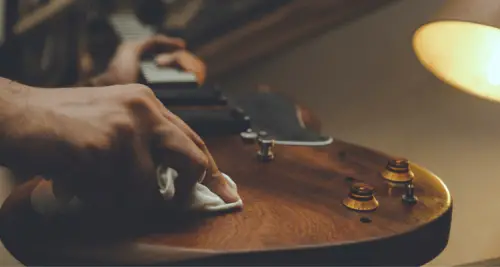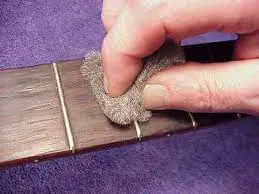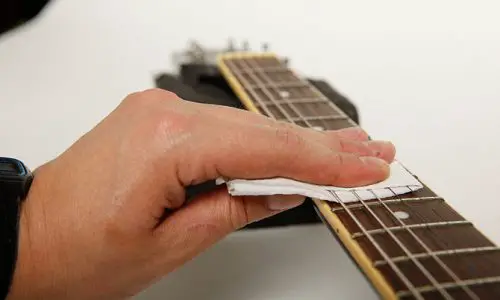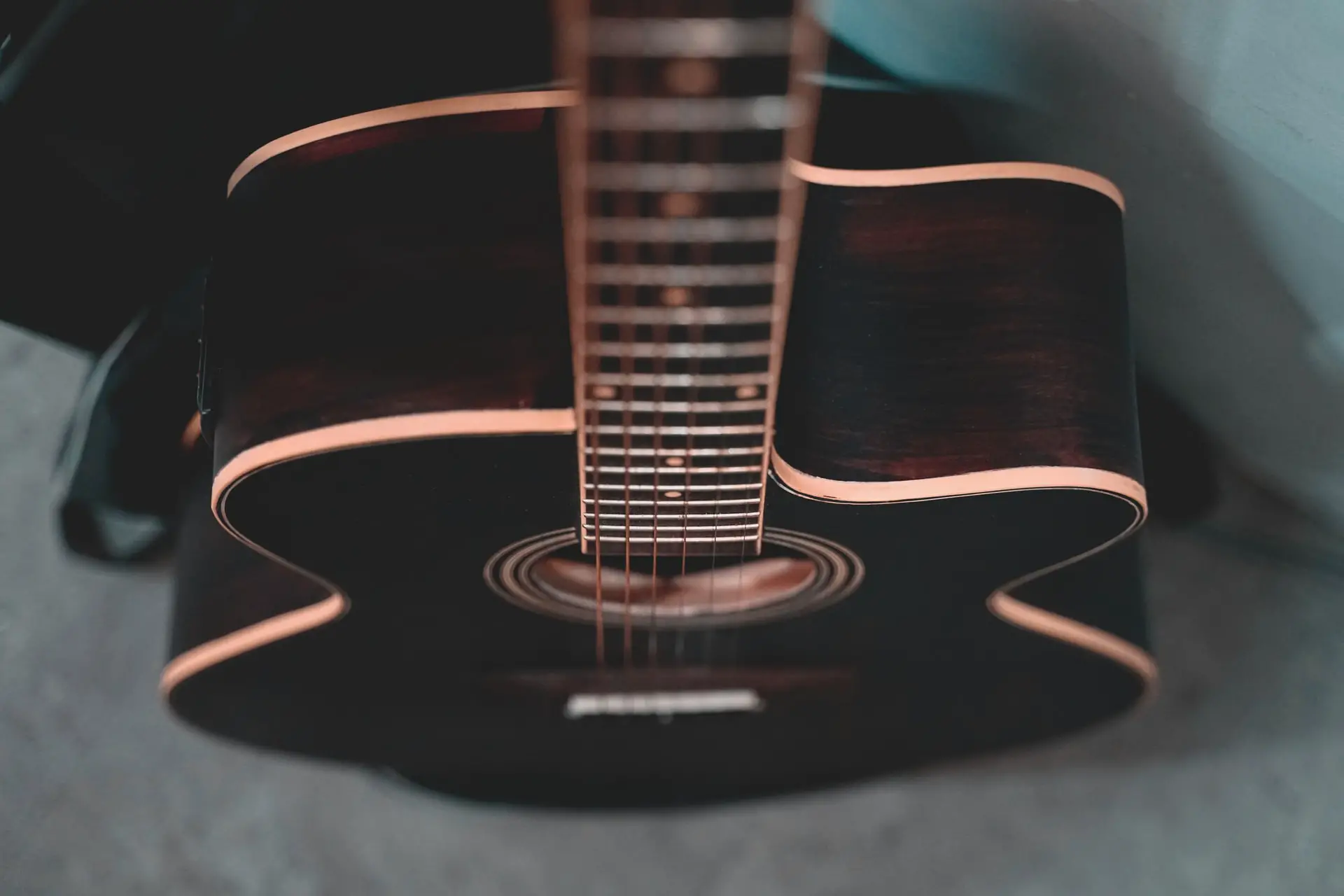A great way to clean and prevent your guitar from getting sticky is by regularly cleaning it by giving it a good wipe with sandpaper or steel wool and washing your hands before playing.
You can also consider different cleaning methods depending on your guitar’s material.
I understand how it can feel to have a sticky guitar neck – it’s an uncomfortable feeling and takes the fun out of guitar playing (I was in your shoes).
There are numerous reasons why your guitar might be getting sticky and multiple ways to resolve this issue. It’s important to know what cleaning method your guitar needs to prevent it from losing its value.
This article highlights everything you need to know about stick guitars. Upcoming content includes:
- How to Clean a Sticky Guitar
- When to Clean Your Guitar
- Why You Should Keep Your Guitar Clean
- Why Do Guitar Strings & Neck Get Sticky
- Preventing Your Guitar From Getting Sticky
How to Clean a Sticky Guitar
Here, you can learn how to clean and protect the most critical parts of your guitar.
Similar procedures are used to clean most types of guitars. The differences in cleaning procedures are mainly because of the kind of wood used on the guitar.
For example, unfinished wood and fretboard require special attention and care. Unfinished and unoiled fretboards can start to crack, which looks nasty. Moreover, it can lead to frets popping out or becoming loose.
Preparing a guitar to be cleaned
Before you start cleaning each part of the guitar separately, there are some standard prerequisites that you need to take into account. These steps apply to electric, acoustic, or classical guitars.
1. Lay Your Guitar on a Flat Surface & Balance it
Before cleaning your sticky guitar thoroughly, the first thing you need to do is to lay it flat on a clean surface. You’ll need support under the neck or headstock of the guitar to keep the tension distributed equally.
Keeping the tension distributed is crucial before you take strings off your guitar. An improper method of removing strings can damage your guitar and the truss rod.
2. Remove the Strings & Cover the Pickups
Next, you want to remove your strings very carefully. By removing the strings from your guitar, you can clean the fretboard and strings separately and much more effectively.
If you’re cleaning an electric guitar, you’d need to cover your pickups with tape before you can start cleaning the fretboard. The cleaning process requires you to wipe the fretboard with steel wool, which may damage the magnetic pickups.
Once you’ve successfully removed the strings, you can move on to treating each part of the guitar separately.

How To Clean Guitar Fretboard
In my experience, cleaning the fretboard is a great place, to begin with. It can be magical to see your fretboard transform with a few wipes, and this gives you the motivation to keep going.
1. Wipe the Fretboard With Steel Wool
You’d want to use steel wool of 0000 grade to wipe your fretboard with. Because harsher steel wool can damage and scratch your guitar.
Gently rubbing the fretboard with steel wool will soften the stains and dirt on your fretboard and frets. The softening will make it easier to wash the dirt away and polish your fretboard on the way.
You can use a microfiber cloth to wipe the dust away. Applying a liquid to the fabric is not necessary.
2. Apply Oil to the Fretboard
Oils that are light, organic with no silicone, abrasives, wax, and acid, such as argon oil, can be used for cleaning your sticky fretboard.
Few oils such as coconut, olive, lemon, or vinegar must not be applied to any parts of your guitar since they can damage the wood.
You can find special oils designed for fretboard cleaning. You can apply a few drops of them on your fretboard, let them soak in for a few minutes, and then wipe off the rest.
3. Polish the Frets
You can polish the frets while you’re cleaning the fretboard with similar techniques. However, protecting your guitar with a fretboard guard is strongly advised if your guitar is finished.
You can polish the frets with the same steel wool or use a polishing rubber to give it a better shine.
4. Alternative Methods
There are alternative methods that you can use to clean your fretboard. For example, a cloth with some fretboard-friendly oil can be rubbed over the fretboard.
If the fretboard is extremely dirty, you can use a scraper knife to peel off the dirt. However, you’d need to be careful doing that so you don’t damage the guitar.

Clean fretboard with steel wool
How To Clean Guitar Strings
You need to be wary of using certain household items such as bleach or soap to clean your guitar strings. Instead, using string cleaners and a microfiber cloth effectively delivers positive results.
Bass Strings
An exciting way to clean your bass guitar strings is to boil them. Ten to fifteen minutes of cautious boiling will help loosen the debris and oil from your guitar strings.
Although boiling your strings will sound like they’re new, you should only boil your strings a limited number of times. Boiling them multiple times may cause them to snap off while playing.
Nylon & Steel Strings
A quick and effective method to clean your strings is wiping them with a microfiber cloth. Developing a habit of regularly brushing strings can prolong their life and sound better.
Lubricating strings is another way to make them sound fresh. However, you might not need to lubricate nylon strings because they’re corrosion-resistant.
Please make sure the lubricant you apply on the cloth is not petroleum-based since it can damage the guitar in the long run. And lubricants are not applied directly but through a fabric.

Clean guitar string with microfiber cloth
How To Clean Guitar Nut
The friction on the nut of your guitar can weaken over time. In addition, less friction between the strings and the nut causes the strings to buzz and can cause your guitar to detune often as well.
An efficient way to solve the friction problem is by using a lead pencil on the nut’s slots.
How To Clean Guitar Neck
When it comes to the neck, it’s the quickest part to get sticky and make you feel uncomfortable. Extended practice sessions can make your palms sweaty and oily, which results in stickiness on the guitar’s neck.
Playing smoothly and doing simple chord shifting can become difficult with a sticky guitar neck. However, spending extra effort on cleaning the neck will give you better results in the long run.
Items required to clean guitar neck:
To clean your guitar’s neck, you’ll need a few essential products. Most of these products are household items or easily found in a hardware store.
- Naphtha or any other solvent cleaner
- Tape
- Paper towels or a microfiber cloth
- Scotch Brite pad
Steps to clean guitar neck:
- Rub guitar neck with naphtha or any other cleaner without wax.. This removes stains and oiliness.
- Apply tape to the neck’s parts with the headstock and the body. The tape will keep the shine after the cleaning.
- Use scotch brite with little water to rub over the neck with the tape applied. Applying the right amount of pressure is crucial. Extra stress can damage the neck, and less pressure will not be adequate.
- Let the neck dry and take the tape off. The stickiness will be wiped off, and you can enjoy your clean guitar.
Alternative Method to cleaning guitar neck:
Giving the neck a good rub with warm water and a soft towel can be effective for some guitars.
Using fingerboard oil on a piece of cloth to rub over the back of the neck is also helpful and quick to do.
How To Clean Guitar Body
Cleaning the body of the guitar is relatively simple and easy to do. It only requires a few items and can be completed within a moment.
-
Use microfiber cloth with some water to rub away most of the stains from your guitar’s body.
- Polish the guitar body with guitar polish that you can get from Amazon (any one will do – it doesn’t have to be expensive.
When to Clean Your Guitar?
Once your guitar starts looking filthy, sounds and feels different, you might want to clean it thoroughly. However, deep cleaning and oiling your guitar two to three times a year should be enough.
A gentle wipe after every practice session can prevent your guitar from getting excessively dirty.
It would be best to clean your guitar regularly to avoid oily feeling and stickiness. Regular cleaning is a great habit and can pay you off in the long run by holding the value of your guitar for longer.
Over time, guitar strings can get dirty and might need to be cleaned if not replaced. Strings that need to be cleaned have a distinctive tone recognizable from clean and fresh strings.
Oily and sticky strings have a damp and dull sound. So to get the original sound back of your strings, you’ll need to clean them properly.
Why You Should Keep Your Guitar Clean
A clean guitar not only looks great but is also the fastest way to make your guitar sound much better. A spotless guitar will enhance your guitar skills because a sticky one can be uncomfortable and greasy to play.
Apart from that, your guitar and gear will inevitably be exposed to bacteria and unwanted germs. By regularly cleaning your sticky guitar, you get rid of bacteria and germs and also get a clean, fresh look for your guitar.
A close observation of your guitar’s strings, neck, and body might leave you surprised. Your fretboard and neck are vulnerable spots and can get dirty quickly without consistent maintenance.
If you’re passionate about guitars, you must understand the importance of keeping your guitar clean.
Cleaning your sticky guitar, its strings, and the fretboard is one of the most effective and cheapest ways to make your guitar sound better, feel better, and keep the strings durable.
Why Do Guitar Strings & Neck Get Sticky
Any guitar can end up with a sticky neck and strings because of the external environments, playing technique, hand oils, and sweat.
Here are 3 main reasons why guitar strings and net get sticky:
- Humid environment. Where you live and keep your guitar when you’re not practicing affects the stickiness—extra humid weather results in increased stickiness on your guitar’s neck.
- Dirt settles down over time. If you haven’t been cleaning your guitar regularly, the dirt and oils on your guitar will mix and settle down over time. These molecules can result in increased stickiness.
- Buildup sweat. Your guitar’s stickiness depends on how you treat and play your guitar. More brutal practice sessions at length will make your guitar sticky much quicker due to sweat from your arms and hands.
However, it’s nothing to worry about, and a detailed cleaning session will make your guitar feel brand new.
As long as you’re making an effort to keep your guitar clean, you don’t have to worry about your guitar getting sticky and losing its value.
Preventing Your Guitar From Getting Sticky
Once you’ve cleaned your guitar, you have to find a way to prevent it from getting sticky again. Some of the measures that you can take to avoid a sticky guitar are
- Wash your hands before playing
- Regularly wipe dust and keep your guitar clean
- Keep your guitar in a hard case
Final Thoughts
Sticky guitars are a problem that all guitarists face. Fortunately, there are ways to prevent this from happening. You can clean your guitar yourself with the help of some essential household items such as microfiber cloth and 0000 steel wool.
A habit of keeping your guitar clean will hold its value, prolong its life, and feel great to play.





